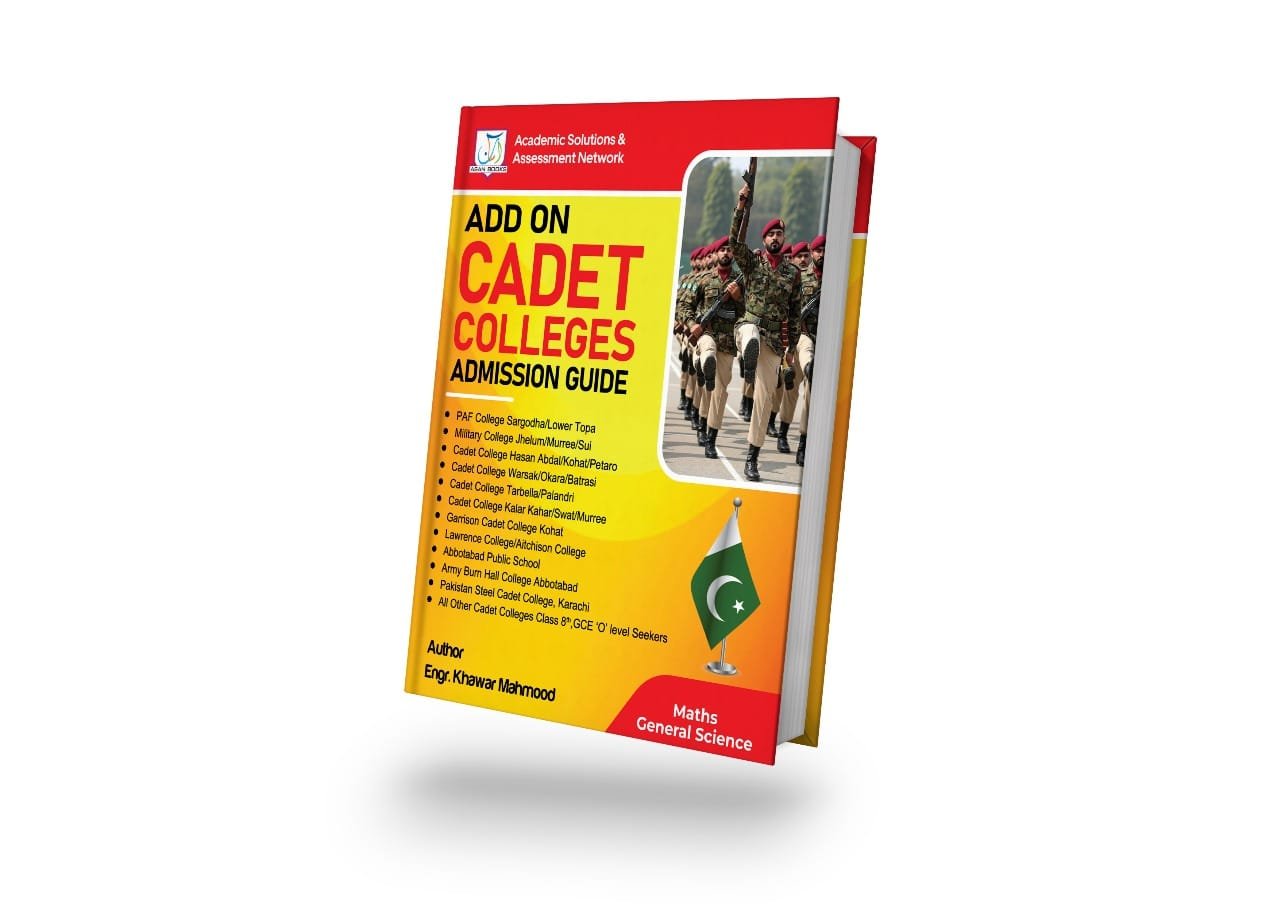Mastering the Cadet College Entrance Test: Your Ultimate Preparation Guide
Aspiring students and their parents often dream of the disciplined, academically strong education found in cadet colleges. These special schools are well-known for helping young people become future leaders. They teach strong values like discipline, integrity, and doing great in school. Getting into a cadet college is very competitive, mostly depending on how well you do on a tough entrance exam. This article is your full guide to understanding and passing the cadet college entrance test. It gives you the information and plans you need for this tough, but very rewarding, path. We’ll cover everything, from knowing the test’s design to sharpening subject skills and using smart test-taking moves. This ensures you’re ready to face the cadet college test with real confidence.
Getting ready for the cadet college entrance test is a long journey, not a quick dash. It calls for a smart approach that includes not just school smarts but also mental strength and being physically ready. Many students who succeed often say that starting early and studying steady really matters. They also stress deeply knowing what the exam specifically asks for. This guide aims to make the whole process clear. It gives helpful advice and ideas that will light up your path to admission. You’ll be set for success at the cadet college you pick.
Understanding the Cadet College Entrance Test Structure
Cadet college entrance exams typically include a mix of academic and sometimes non-academic parts. While the exact setup can shift a little from one cadet college to another, there’s a common core you should know. Knowing this structure helps you make a solid study plan. It takes away some of the mystery around this important cadet college test.
Academic Subjects Tested
The primary focus of any cadet college entrance test is on core school subjects. These tests want to see a strong foundation in key areas. What subjects will you face?
- Mathematics: Expect questions on basic math operations, like arithmetic. You will also see problems from algebra, such as solving equations. Geometry, dealing with shapes and spaces, is usually present. Some tests might even include basic trigonometry.
- Science: This section covers a range of scientific fields. You’ll find questions on fundamental concepts in physics. Chemistry will test your knowledge of substances and reactions. Biology questions will focus on life sciences. The goal is to check your understanding of science basics.
- English: English skills are very important for cadet colleges. This part of the test checks your grammar rules. It also tests your vocabulary, asking about word meanings. Reading comprehension tasks will see how well you understand written passages. You’ll also likely need to write an essay.
- General Knowledge/Current Affairs: This section measures how aware you are of the world. It includes questions about national and international happenings. History and geography are common topics. Sometimes, general science facts might pop up here too.
Non-Academic Components
Some cadet colleges include other types of assessments besides school subjects. These parts help them understand your full potential and suitability for their special environment. These non-academic tests look at different skills.
- Intelligence and Aptitude: These tests check your thinking skills. You might find questions on logical reasoning, where you solve puzzles. Problem-solving questions are also common. Spatial awareness tests, like visualizing shapes, could be included.
- Psychometric Evaluation: This type of assessment looks at your personality. It helps cadet colleges see if you have traits like leadership potential. They want to know if you’re a good fit for their disciplined way of life. These tests are about understanding who you are.
Exam Format and Scoring
Knowing how the cadet college entrance test is set up and scored is key to preparing well. Different types of questions can be used to test your knowledge.
- Question Types: Exams often feature both objective and subjective questions. Objective questions are usually multiple-choice, where you pick the best answer. Subjective questions might be short answer questions or full essay writing tasks.
- Marking Scheme: Understanding how points are given is crucial. Most tests have positive marking, meaning you get points for correct answers. Some tests might also use negative marking, where points are taken away for wrong answers. It is vital to know this before you start. Each section often carries a different weight, so some parts count more than others.
Strategic Preparation for Academic Subjects
Doing well on the academic parts of the cadet college test needs smart studying. Each subject requires its own special way to prepare. This approach helps you gain a deep understanding.
Mastering Mathematics for Entrance Exams
Mathematics can feel tough, but with the right plan, you can shine. How can you improve your math skills for the cadet college test?
- Concept Clarity: Don’t just memorize formulas. It’s much better to truly understand the basic ideas behind mathematical rules. Why does a formula work? This deep understanding helps you solve all kinds of problems.
- Practice Diverse Problems: Work through many types of math problems. Use your textbooks and past cadet college exam papers. The more kinds of problems you solve, the better you get at recognizing patterns. This builds your problem-solving muscle.
- Time Management during Math Sections: Math often takes the most time. Practice solving problems quickly and correctly. Develop ways to work through questions fast under timed conditions. You should not get stuck too long on any single problem.
Strengthening Science Comprehension
Science questions in the cadet college test often go beyond simple facts. They look for how well you grasp the “why” and “how.” What’s the best way to tackle science?
- Relate Theory to Practicality: Always try to link what you learn in science to real-world examples. How does physics explain why a ball bounces? This makes concepts stick better. It makes science more interesting too.
- Diagrams and Visual Aids: Use pictures and drawings to help you learn. Drawing a diagram of a cell or a chemical reaction can make complex ideas clearer. Visuals help your brain connect information faster.
- Targeted Revision: Some science topics show up more often on cadet college entrance exams. Find out what these are and focus your study time there. This makes your revision more efficient.
Excelling in English Proficiency
English skills are vital, from reading instructions to writing clear responses. How do you get top marks in English for the cadet college test?
- Vocabulary Building: Read a lot of different things, like books and articles. Keep a notebook for new words you find. Use flashcards and try to guess word meanings from their context. Consistent practice will grow your word bank.
- Grammar Rules and Application: Know your grammar rules inside and out. Practice using them correctly in sentences. Work on common mistakes like subject-verb agreement or correct use of punctuation. Strong grammar makes your writing clear.
- Reading Comprehension Techniques: Learn ways to read passages quickly yet still understand them fully. Practice finding the main idea and important details. Answering questions accurately after reading is a key skill.
- Essay Writing Practice: Practice writing essays often. Always use a clear outline to structure your thoughts. Make sure your arguments are logical and easy to follow. Use strong, convincing language to impress the examiner.
Developing Non-Academic Strengths
The cadet college entrance test isn’t just about school subjects. Many institutions also assess other traits important for leadership and discipline. Preparing for these non-academic parts is just as crucial.
Enhancing Logical Reasoning and Problem-Solving Skills
Strong logical thinking helps in all areas of life, including the cadet college test. How can you sharpen these important skills?
- Pattern Recognition Exercises: Work on puzzles and sequences that ask you to find the next item in a series. This trains your brain to spot patterns quickly. There are many books and online resources for these.
- Critical Thinking Development: Learn to look at situations closely. Practice figuring out what assumptions are being made. Then, draw logical conclusions based on the facts. This skill is useful for many types of problems.
Understanding Psychometric Assessment Tools
Psychometric tests help cadet colleges understand your personality and how you handle situations. While you can’t really “study” for these, you can be ready.
- Self-Awareness: Think about your own strengths and weaknesses. How do you usually react to challenges? Understanding yourself helps you approach these tests truthfully. It also shows you are thoughtful.
- Simulated Tests: Look for practice psychometric tests online. Doing a few of these helps you get familiar with the types of questions they ask. It lets you see the format and understand what to expect.
Effective Test-Taking Strategies and Tips
The day of the cadet college test can be nerve-wracking. Having a plan for how you’ll approach the exam itself can make a big difference. These strategies help you perform your best.
Time Management During the Exam
Running out of time is a common problem. A smart approach to managing your time will help you finish the cadet college test completely.
- Prioritize Sections: Quickly look over the whole exam. Decide which sections you’re strong in or which ones take more time. You might want to tackle easier sections first to build confidence.
- Pacing: Don’t spend too much time on one hard question. If you’re stuck, make a quick note and move on. You can always come back if there is time left. Keep a steady pace throughout the test.
Answering Techniques for Different Question Types
Each question type needs a slightly different way of answering. Knowing these techniques will help you maximize your score on the cadet college test.
- Elimination Strategy for MCQs: For multiple-choice questions, if you don’t know the answer, try to rule out the wrong choices first. This increases your chances of picking the right one. Often, two options are clearly incorrect.
- Answering Short Answer Questions: Be direct and to the point. Give only the information asked for. Avoid adding extra details that aren’t necessary. Clarity is very important.
- Structuring Essay Responses: Always start with an outline for your essay. This helps you organize your thoughts. Use clear topic sentences for each paragraph. Make sure your points connect logically, building a strong argument.
Maintaining Composure and Confidence
Test day pressure is real. How you handle your nerves can affect your performance. Keeping calm and believing in yourself is very important for the cadet college test.
- Mindfulness and Relaxation Techniques: Practice simple breathing exercises. Take a few deep breaths before the test starts. If you feel stressed during the exam, pause and take another deep breath. This can calm your nerves.
- Positive Self-Talk: Remind yourself of all the hard work you’ve put in. Think positive thoughts like, “I am ready for this,” or “I can do this.” A confident mindset helps you focus better.
Post-Test Procedures and Next Steps
The written cadet college test is often just the first step. If you pass, there are usually other parts to the admission process. Knowing what comes next helps you stay prepared.
The Interview Stage
Many cadet colleges include an interview as a crucial part of their selection. This is where they learn more about you beyond your test scores.
- Common Interview Questions: Be ready for questions about your interests, your goals, and why you want to join a cadet college. They might ask about current events too. Practice answering these questions aloud.
- Demonstrating Leadership Potential: Show that you’re responsible and can work with others. Talk about times you’ve led a group or helped solve a problem. Cadet colleges value these qualities.
Medical Examination and Physical Fitness
Cadet colleges focus on developing the whole person, including physical health. A medical check-up is typically required.
- Health and Fitness Requirements: Make sure you are in good health. There are usually specific physical standards you must meet. These checks confirm you are fit for the rigorous cadet college life. Staying active and eating well helps you meet these standards.
Conclusion: Your Path to Cadet College Success
Preparing for the cadet college test is a significant undertaking. It needs a balanced strategy, combining smart study habits with strong mental and physical readiness. We covered understanding the exam layout, building academic strengths, and developing non-academic skills. You also learned essential test-taking strategies. Remember to clarify math concepts, link science to real life, and practice English skills daily. Mastering logical reasoning and staying composed under pressure are just as vital.
The journey to cadet college might seem long, but the rewards are immense. A cadet education offers much more than just good grades. It instills leadership, discipline, and a strong character that will benefit you for life. Keep your focus sharp, stay committed to your goals, and believe in your abilities. Your hard work in preparing for the cadet college entrance test will open doors to a future filled with opportunity and success. You’re ready to take this important step.



